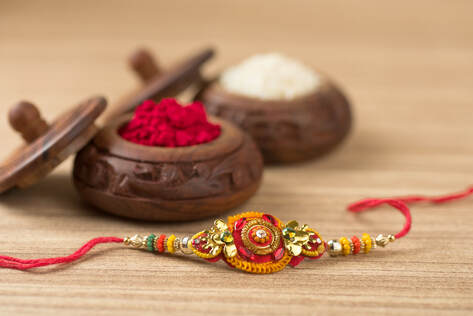Raksha Bandan
This festival is more than just a celebration of
the brother-sister bond.
The day when the siblings pray for each others'
well being and wish for each others' happiness
and goodwill.
As the name 'Raksha Bandhan'
suggests, 'a bond of protection', Raksha Bandhan
is a pledge from brothers to protect the sister from all harms and troubles and a
prayer from the sister to protect the brother from all evil.
It also signifies the importance of Guru of spiritual master in one's life. Hindu males
who have taken vows to their Guru exchange their holy threads (yajo-pavitra) on
this day and make special offerings to their Gurus or ancestors.
Of all castes, Brahmins consider this day most important as they exchange their
sacred thread and recite mantras as well as vedhs and purans.
Our rishis (saints) have often pointed out that those of us who go through gurmukh
or yajo-pavitra sanskar in our youths swear allegiance to our Guru, and on this
Raksha Bandhan day pay respect to our spiritual master.
The sacred thread symbolises the third eye or the eye of wisdom - one which
transforms the young boy into a new man.
The Origin of Raksha Bhandhan
The katha at the origin of Raksha Bhandhan is multifold:
Rajah Bali
The original katha from which the Raksha Bandhan ritual comes, is about Rajah Bali,
the former demon King who became the great devotee of Lord Vishnu (as Vaman
Avatar).
After changing his ways Rajah Bali received a vardhan ( boon) from Lord Vishnu to
have HIM always guard his kingdom.
Lord Vishnu had to leave his own adobe in Vaikunth dhaam and go to Rajah Bali's
kingdom in Sutal Lok.
During Lord Vishnu's absence from Vaikunth Dhaam, Mata Lakshmi felt very lonely
as though being widowed. So Sri Lakshmi-ji went to Sutal Lok disguised as a
Brahmin woman to find her husband and beg for his return.
Mata Lakshmi-ji arrived there during the Shravan Purnima celebrations. She tied a
Rakhi around Rajah Bali’s right wrist adopting him as her brother. She revealed who
she was and why she was there. The king was touched by her goodwill .
In return Rajah Bali gave her the boon of having her husband back for 8 months of
the year. While Lord Vishnu was not guarding Rajah Bali, Lord Shiva and Lord
Brahma each agreed to take turns to look after Rajah Bali in HIS absense.
The day that Mata Lakshmi-ji tied the raksha on Rajah Bali’s wrist is the day we
celebrate as Raksha Bandhan.
Sri Indra Dev
The second katha relating to Raksha Bandhan is of Lord Indra, the king of all
devtas, who had the holy thread tied around his wrist by Sachi (his consort or wife).
As a solution to defeat the advancing demons with whom Indra was battling, Guru
Brihaspati asked Sachi to tie the rakhi on her husband’s wrist, for his protection.
With the protection given by the power of scared mantras in that rakhi, lord Indra
achieved his goal by conquering Amravati, the demon king.
Sri Krishna Govind
In the Mahabarath there is a katha where Lord Krishna advised Yudhishthir to
perform the ritual of Raksha Bandhan to protect himself and his army from the
dangers of war.
Also Queen Kunti (of the Pandavas) tied a raksha on her grandson Abhimanyu to
protect him in battle.
Draupadi also became the sister of Lord Krishna when she bandaged his bleeding
finger.
Sri Yam Dev
It is also stated in some scriptures that Yamuna tied the rakhi on the wrist of her
brother Lord Yama giving him immortality.
Lord Yama declared after this touching ceremony that whoever has a rakhi tied on
their wrist by their sister and pledges their protection will gain immortality.
On this Raksha Bandhan day
We pay respect for the spiritual knowledge we have achieved from our Gurus
We make offerings to spiritual Gurus including parents to whom we owe our birth,
especially those of Brahmin background.
- Brothers and sisters exchange sweets and gifts to commemorate the past year
and give assurance for the coming year’s continuing bond and protection of their
siblings. Sisters visit the homes of their brothers and tie a rakhi or raksha bandan on
the hand of their brothers.
The following mantra is chanted whilst changing the holy thread:
Yena baddho balee raajaa daanavendro
mahaabalah;
Tena twaam anubadhnaami rakshey maa chala maa chala.
It is the same mantra used by purohits or priests when tying a thread around the
wrist of their devotees. And when it comes to tying the Rakhi or Raksha around their
brothers' hands, their sisters also recite this powerful mantra - from which we
pledge:
"I am tying on your hand this Raksha,
with which the most powerful and generous King Bali himself was
bound; O
Raksha, don’t go away; don’t go away."
Raksha means protection, and bandhan means bond, hence Raksha Bandhan is a
bond of protection.

